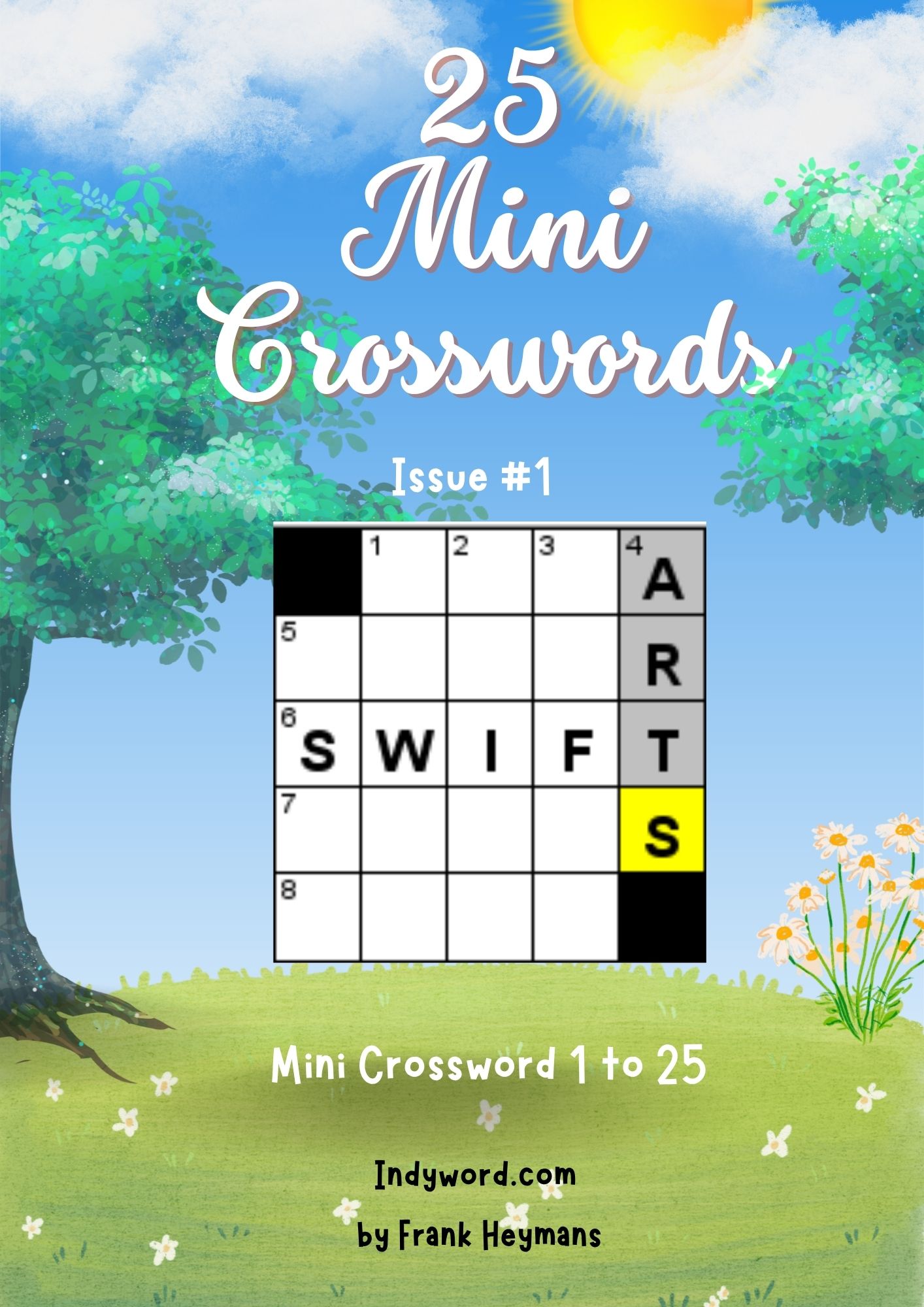Bookmark this page - Use keyboard short-cut: Ctrl+D - For Your Benefit
Advisory
Use the Google Chrome web-browser to play the interactive crossword puzzles displayed on Indyword.com.
Specially when you are using a mobile device, like a smartphone or tablet.
Mini Crossword Puzzles: A Brief History, Proven Benefits, and the Simple Joy They Bring
Mini Crossword Puzzles: A Brief History, Proven Benefits, and the Simple Joy They Bring
🧩 - Mini Crossword - Crossword puzzles have long been a staple of newspapers, magazines, and coffee tables. But in recent years, mini crossword puzzles—small, bite-sized versions of the classic word game—have emerged as a powerful daily habit for minds both young and old. These quick puzzles, often solvable in just a few minutes, are more than mere distractions: they represent a meaningful blend of tradition, cognitive benefit, and modern-day convenience.
In this article, we’ll explore the origin of the mini crossword, unpack the science-backed benefits of playing them, and tap into the joy and satisfaction they bring to daily life.
Scroll down to play the mini crosswords.
When you sign-up for the Indyword Crossword Puzzle Newsletter, you will be able to download a free copy of the "30 Easy Free Printable Crosswords" e-book. You will receive the link in the e-mail which I send you, to thank you, after we receive your confirmation. Sign up it's only a click away and takes just a minute!
🕰️ The History of Mini Crossword Puzzles
The very first crossword puzzle was published in 1913 by Arthur Wynne in the New York World newspaper. It was shaped like a diamond and didn’t even have black squares. Still, it quickly captivated readers. From there, the crossword became a global sensation.
By the mid-20th century, major newspapers like The New York Times, The Guardian, and Le Monde had daily crosswords that challenged readers of all backgrounds. These puzzles grew in size and complexity, with many people considering the Sunday edition the pinnacle of linguistic and logical challenge.
But not everyone had the time—or patience—to tackle a large grid each day. Enter the mini crossword puzzle.
✂️ The Rise of the Mini
The mini crossword was popularized in the 2010s, particularly by The New York Times, which launched its daily mini crossword in 2014. Created by Joel Fagliano, these 5×5 puzzles were quick to complete yet satisfying to solve. The idea was to keep the mental sharpness of a full puzzle, but in a form that fits your morning coffee break or daily commute.
From there, countless platforms adopted the format: educational apps, ESL learning tools, language sites, and puzzle books. In the digital age—where time is short and attention is scattered—the mini crossword found its sweet spot.
🧠 The Benefits of Mini Crossword Puzzles
Though mini in size, these puzzles deliver maxi benefits. Let’s take a look at what science and experience tell us about why mini crosswords are so good for you.
1. Boost Brain Function
Solving crosswords activates a wide range of cognitive functions:
- Language processing
- Memory retrieval
- Logical reasoning
- Pattern recognition
According to cognitive scientists, even short bursts of problem-solving can increase neuroplasticity—your brain’s ability to form and reorganize synaptic connections.
2. Expand Your Vocabulary
With mini crosswords, you’re constantly exposed to new words, clues, and cultural references. This helps:
- Improve spelling
- Expand passive vocabulary
- Encourage curiosity about meanings
For language learners, this is particularly powerful. It turns rote vocabulary learning into a playful, discovery-based activity.
3. Promote Daily Mindfulness
Doing a mini crossword each day becomes a small ritual—a mindful moment of focus that replaces scrolling or multitasking. Like meditation, it centers your attention on one task.
Just a few minutes of quiet thinking and wordplay can:
- Reduce stress
- Increase mental clarity
- Improve mood
4. Sharpen Problem-Solving Skills
Clues in mini crosswords often require creative thinking. They teach you to:
- Look at words from different angles
- Make logical connections
- Work with constraints
That kind of quick thinking pays off beyond the grid—in meetings, conversations, or when making decisions.
5. Create a Healthy Daily Habit
Because they’re short and satisfying, mini crosswords make it easy to build a daily cognitive habit. Unlike longer puzzles, you don’t need 20+ minutes. Just 2 to 5 minutes a day is enough.
Over time, that small habit compounds into a more agile, confident brain.
😊 The Joy of Solving
There’s something undeniably delightful about mini crosswords. Here’s why people love them:
✅ Quick Wins
We live in a world filled with long to-do lists and endless work. A mini crossword offers a tiny, complete win. You start and finish a challenge in just a few minutes. That hit of dopamine—the reward chemical—is real and motivating.
🎯 Just Enough Challenge
Mini puzzles are designed to be smart but not impossible. You feel engaged, but rarely frustrated. That balance makes them addictive in a good way.
🧩 A Sense of Mastery
Each puzzle solved builds your confidence. Over time, you recognize clue patterns, guess word lengths faster, and even begin to anticipate trickier clues.
This is especially true when you do the same style of puzzle daily—you grow with it.
📱 Portable & Accessible
Whether on your phone, tablet, or a small printed book, mini crosswords go with you. They’re ideal for:
- Public transport
- Coffee breaks
- Waiting rooms
- Study sessions
You don’t need an app with flashing lights—just a simple, quiet puzzle and a curious mind.
🧭 Mini Crosswords as a Learning Tool
Mini crosswords have become powerful tools for learning languages, teaching kids, and even training older adults in cognitive health.
🌍 In Language Learning
For example, on sites like Indyword.com, learners can find English–Spanish mini crosswords that reinforce vocabulary through fun repetition. A learner doesn’t need to memorize word lists—they just solve a game and learn naturally.
👵 For Brain Health
Neurologists often recommend crosswords for older adults to help prevent cognitive decline. Mini versions make this more accessible for people who may find full puzzles overwhelming.
✍️ Try It for Yourself
Ready to give mini crosswords a go? You don’t need to be a genius or a word nerd to start. All you need is:
- A curious mindset
- A few minutes a day
- The willingness to play
Start with easy ones, keep a dictionary nearby if needed, and gradually challenge yourself with tougher clues. Before long, you'll find yourself enjoying not just the solutions—but the process itself.
🎉 Final Thoughts
Mini crossword puzzles may be small in size, but they pack a punch in brain training, habit formation, and daily joy. They’re part of a growing movement that embraces smart, simple, time-efficient habits.
In a busy world, they remind us that play and learning can be combined, and that even a few minutes of wordplay can make our day better.
So next time you’ve got five minutes, skip the scroll and solve a square.
Scroll down to play the mini crosswords.
📚 Related Literature for Further Reading
🕰️ 1. History & Origins of Crosswords
- John Halpern - A Clue by Any Other
Name: The History of the Crossword Puzzle.
Published in Humanities, Library of Congress.
Link
– A well-researched overview of how crosswords originated in the U.S. and evolved in print. - Coral Amende – Crossword Obsession: The
History and Glory of the World's Most Popular Puzzle.
Link
– A passionate, engaging account that blends history with the author's personal journey into crosswords. - Marc Romano - Crossworld: One Man's Journey into America's Crossword Obsession.
Link
- If you have no idea why your spouse send so much time filling letters into little white squares, Crossworld will tell you – and with luck, save your marriage.
Mini Crossword One
Mini Crossword Two
Mini Crossword Three
Mini Crossword Four
Mini Crossword Five
Links to Crossword Books:
Indyword - Best Sellers in Crossword Puzzles - Click here
Indyword - Best Sellers in Crostic Puzzles- Click here
Indyword - Best Sellers in Cryptic Puzzles - Click here
Indyword - Best Sellers in Puzzle Dictionaries - Click here








